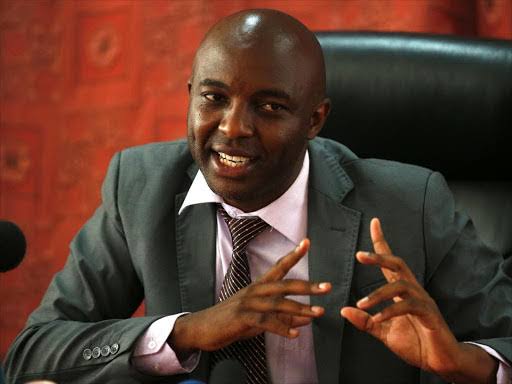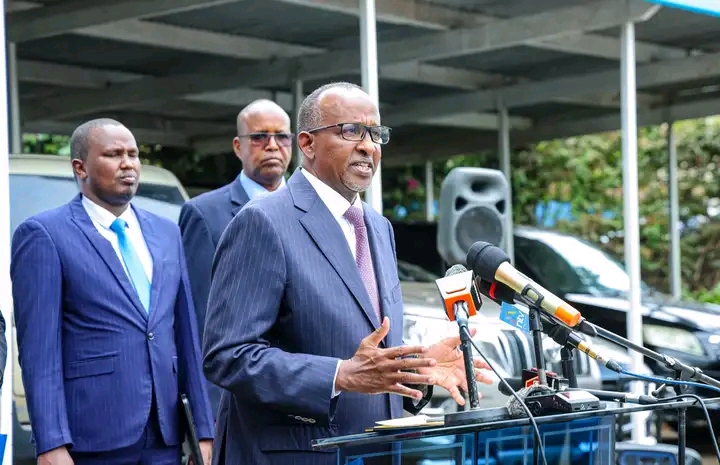-
 TOM HEATON PENS NEW DEAL TO STAY AT MANCHESTER UNITED UNTIL 2026
TOM HEATON PENS NEW DEAL TO STAY AT MANCHESTER UNITED UNTIL 2026
-
 SCHOOLS SHUT DOWN LOOMING
SCHOOLS SHUT DOWN LOOMING
-
 MURANG’A COUNTY GOVERNMENT LAUNCHES A FREE SURGICAL CAMP
MURANG’A COUNTY GOVERNMENT LAUNCHES A FREE SURGICAL CAMP
-
 HANIFA NARRATES HOW SHE WAS ATTACKED BY A GOON DURING PROTESTS IN NAIROBI CBD
HANIFA NARRATES HOW SHE WAS ATTACKED BY A GOON DURING PROTESTS IN NAIROBI CBD
-
 HELB UNVEILS 80% PENALTY WAIVER TO RECOVER BILLIONS IN STUDENT LOAN ARREARS
HELB UNVEILS 80% PENALTY WAIVER TO RECOVER BILLIONS IN STUDENT LOAN ARREARS
-
 CONSTABLE MUKHWANA SPILLS THE BEANS ON OJWANG'S DEATH
CONSTABLE MUKHWANA SPILLS THE BEANS ON OJWANG'S DEATH
-
 KENYAN ARTIST OCTOPIZZO SLAMS POLITICIANS FOR EXPLOITING THE POOR
KENYAN ARTIST OCTOPIZZO SLAMS POLITICIANS FOR EXPLOITING THE POOR
-
 ACTIVIST BILLY MWANGI'S X ACCOUNT SUSPENDED AFTER POSTING CRITICISM TOWARDS ALBERT OJWANG'S FATHER
ACTIVIST BILLY MWANGI'S X ACCOUNT SUSPENDED AFTER POSTING CRITICISM TOWARDS ALBERT OJWANG'S FATHER
-
 RUTO SEALS TOUGH LAWS TO FIGHT DIRTY MONEY , CLEAN UP INSURQANCE SECTOR
RUTO SEALS TOUGH LAWS TO FIGHT DIRTY MONEY , CLEAN UP INSURQANCE SECTOR
728 HEALTH FACILITIES SHUT AS GOVERNMENT CRACKS DOWN ON QUACKS

A total of 728 noncompliant health facilities have been shut down across Kenya, while 301 others have been downgraded, as part of a sweeping government crackdown on unlicensed and substandard health service providers.
Health Cabinet Secretary Aden Duale, speaking on Monday, June 16, 2025, announced that the move is aimed at restoring public confidence in healthcare and eliminating “quacks” who have infiltrated the sector. “We are eliminating fake, unlicensed facilities operating across our republic to guarantee quality of care for our people,” said Duale.
The purge has been made possible through digitisation efforts spearheaded by the Kenya Medical Practitioners and Dentists Council (KMPDC) in collaboration with the Digital Health Agency (DHA) and the Social Health Authority (SHA). The digitisation has also uncovered over three million fake claimants who had been benefiting from the now-defunct National Health Insurance Fund (NHIF).
Among the major reforms is the integration of all regulatory bodies to ensure that only licensed facilities and certified health workers are allowed to operate. Duale issued a warning to health providers: “If you are a SHA-contracted health facility, you must meet the highest standards. If you’re a health worker, you must comply with your scope of practice. If you’re a patient, know this government is protecting your rights.”
The Ministry of Health has also introduced digital health records and data portability through the Afya Yangu platform, now active in 17 counties, including Nairobi, Mombasa, Kirinyaga, and Elgeyo Marakwet, as well as in Kenya Defence Forces health facilities. Phase two of the rollout will target counties such as Homa Bay, Lamu, Kisumu, Kajiado, Wajir, Machakos, and Nakuru.
Duale further revealed that KEMSA has undergone reforms, with the government recapitalising the agency to ensure a steady supply of essential commodities in public hospitals. A Sh10 billion revolving credit facility has been secured to ensure uninterrupted access to medicines and health products in the 2025/26 financial year.
On health financing, Duale reported significant progress in the implementation of the Social Health Insurance Act (2023), spearheaded through the TaifaCare scheme launched on October 1, 2024. As of June 16, 2025, 23.6 million Kenyans had enrolled, with 28,679 new registrations recorded that day alone.
The SHA has contracted 9,365 health facilities countrywide, 5,219 public, 3,650 private, and 496 faithbased, with 5.7 million Kenyans already accessing care under the Primary Healthcare Fund (PHCF) and the Social Health Insurance Fund (SHIF).
So far, 3.6 million patients have received basic treatments for malaria, pneumonia, injuries, mental and eye health, while expectant mothers have benefited from antenatal and postnatal services under PHCF. Under SHIF, 2.1 million Kenyans have accessed specialised care, including 400,000 dialysis sessions, 19,509 imaging procedures, and 17,377 cancer treatments. Additionally, over 360,000 normal deliveries and 116,000 Caesarean sections have been supported.
In terms of funding, Sh5.4 billion in PHC claims have been paid, 53% to public, 38% to private, and 9% to faith-based facilities. A further Sh1.2 billion is scheduled for disbursement on June 17. Since the scheme’s inception, Sh43.8 billion has been paid under SHIF, including Sh6.2 billion released on June 13 alone.
To expand access and reduce costs, the Ministry is partnering with leading private hospitals like Aga Khan University Hospital and Nairobi Hospital to provide advanced services, including kidney transplants and cancer treatment, at SHA rates with no out-of-pocket payments. In collaboration with Roche Pharmaceuticals, the cost of breast cancer drug Herceptin has dropped from Sh120,000 to Sh40,000.
Duale reiterated that the SHA offers a more inclusive, accountable financing model compared to the NHIF, which he criticised for inefficiencies and Sh40 billion in unpaid hospital debts. The SHA model caps administrative costs at 5%, ensuring 95% of contributions go directly to healthcare services.
To support Kenya’s informal sector, which makes up 80% of the population, the government has introduced “Lipa SHA Pole Pole,” a flexible, interest-free contribution plan that allows daily, weekly, or monthly payments. So far, 1.8 million informal workers have paid premiums in the last eight months, surpassing NHIF’s annual record.
“This is a transformative moment for Kenya’s health sector. We are not just fixing the system we are rebuilding it to serve every Kenyan with dignity, professionalism, and integrity,” Duale concluded.


Comments (0)
No comments yet. Be the first to comment!